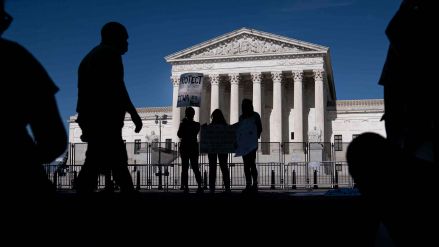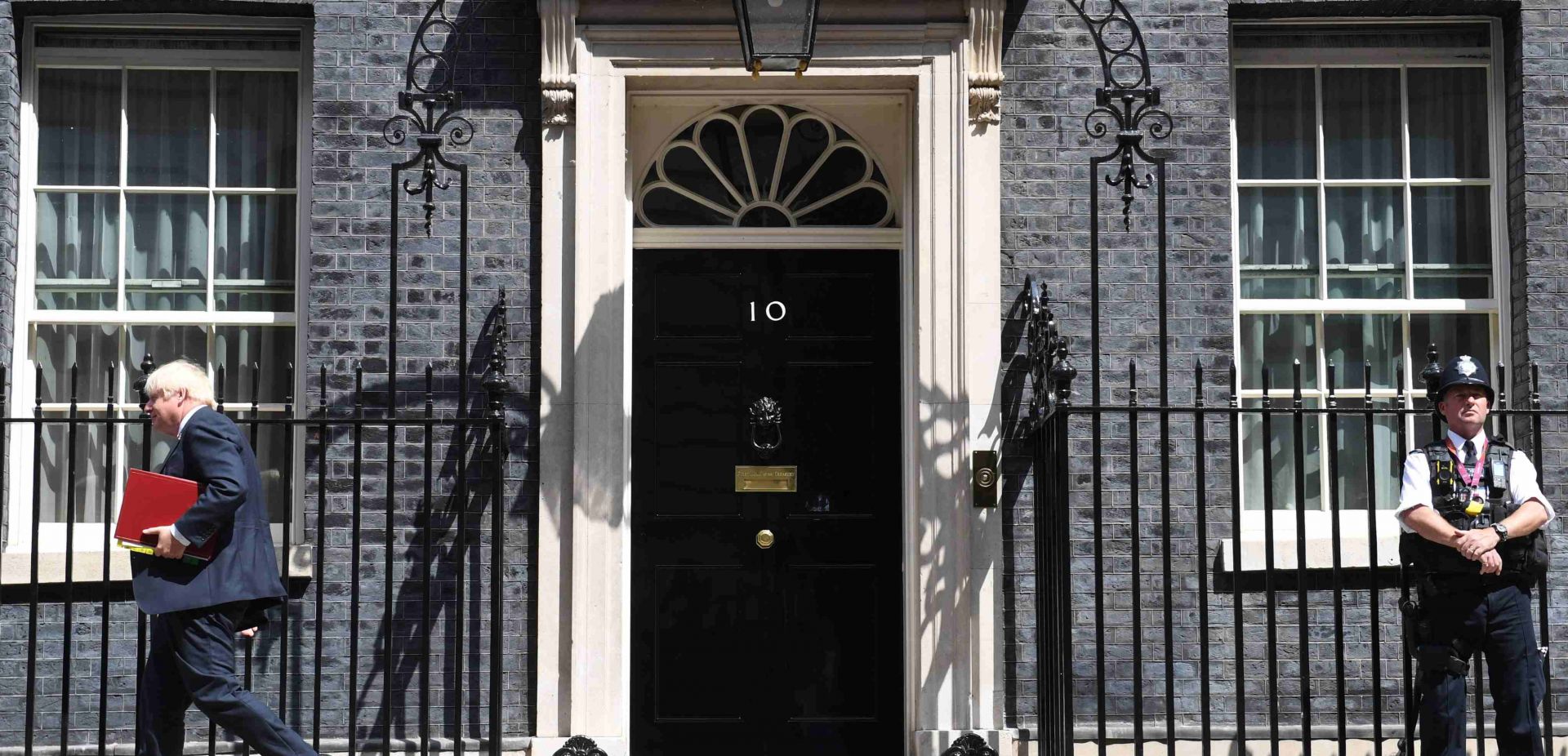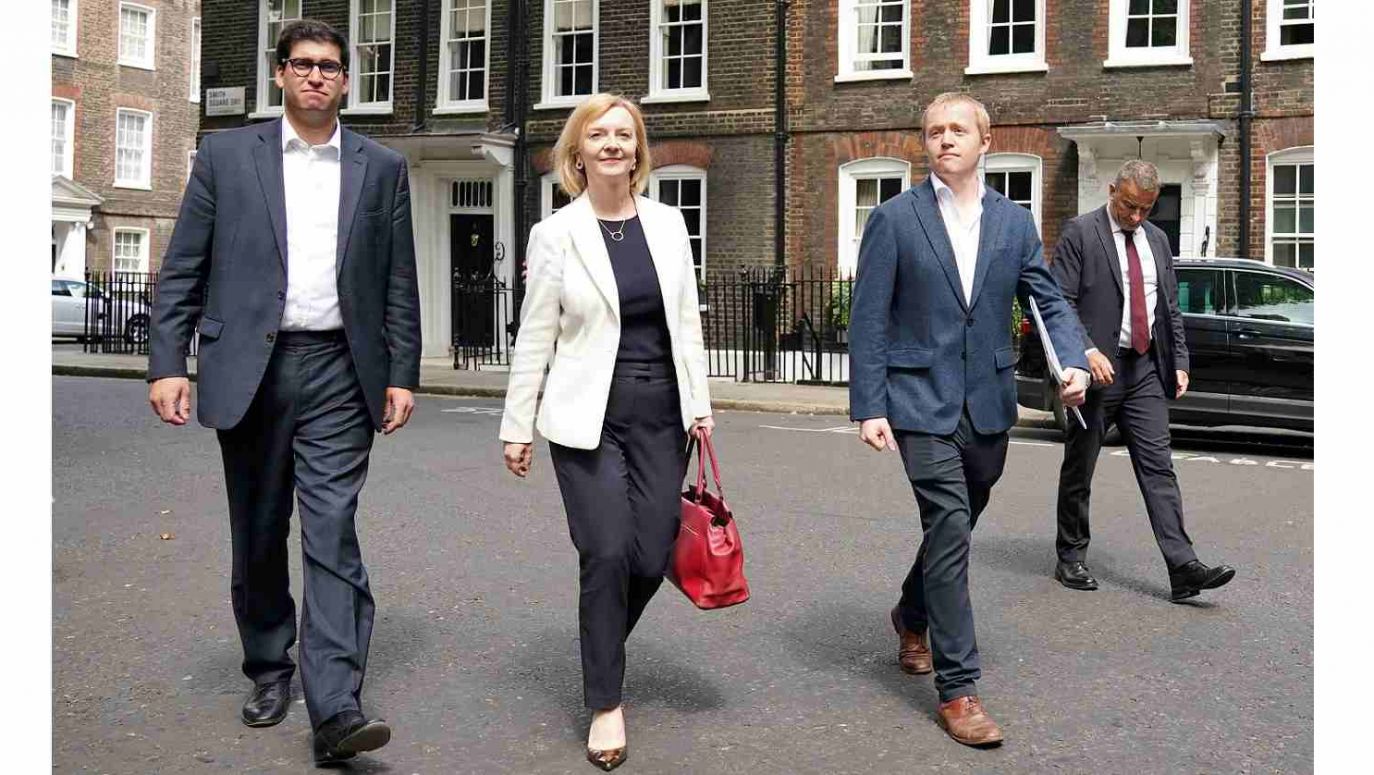Landscape after a dirty battle. Views don't matter, positions count
03.08.2022
Asked who among the candidates for his successor he would be able to support, Boris Johnson replied: "Anyone, except Rishi Sunak". The treacherous minister does not, in his view, deserve support or a good word.

Is this the end of the US as a federation?
see more
Actually, this is nothing new. Kingslaying, literally and figuratively, has a centuries-old tradition in England. The Conservatives once got rid of Margaret Thatcher in a similar way. However, this was done quite discreetly, in a much less spectacular manner. It has never happened before that half of the Prime Minister's government, including his closest colleagues, came out against the Prime Minister. For this reason, too, the Conservative Party election will go down in British political history - though hardly in letters of gold.
Mutual backbiting campaign
Rishi Sunak, ex-Chancellor of the Exchequer, and Liz Truss, Foreign Secretary - these are the two who were selected by a closed group of 357 Conservative Party MPs in the House of Commons, who eliminated the candidate with the least number of votes in daily votes. The final choice will be made by all party members - 200,000 people - in early September. It is therefore to them that potential leaders now turn, in TV debates and face-to-face meetings.
With the Conservatives' parliamentary faction selecting two candidates, the most conflictive stage of the race was closed. The members of the party have other considerations than the hermetic group of MPs. They are ordinary people, ordinary voters, for whom it matters how the prime ministerial candidate sees the functioning of the National Health Service or the education system, whether he or she intends to cut taxes or raise them, what defence spending he or she plans to do. For party politicians, on the other hand, it is equally, if not more important, what position the candidate can promise them.
The parliamentary campaign was thus not so much a show of open, honest competition as a fierce biting and hoodwinking of each other's allies regardless of what views they held - like the candidate or perhaps quite the opposite. Since every vote was at stake, views were relegated to the background. Faced with the highest stakes - because leadership of the party also means becoming prime minister - all tricks were allowed.
The parliamentary stage is so conflictual not only for this reason. The candidates, in a very short space of time - the whole procedure lasted just over a week - have to achieve two objectives: to secure a place in the final two and, at the same time, to steer the course of the subsequent voting stages in such a way that the latter, i.e. the direct rival, becomes someone who is easiest to defeat.
These two completely different aspects make up the final outcome. This one, in turn, does not necessarily have to duplicate the decision taken by MEPs - and it is possible that this will be the case this time.
Throughout the campaign, Rishi Sunak, always in first place, was seen as the absolute favourite for the post of Prime Minister. He progressed to the national stage by a large margin over Liz Truss, as he received 137 votes, while Ms Truss was supported by 113 MPs. 105 votes went to Penny Mordaunt, who therefore dropped out of the race.
The aforementioned mechanism of pulling up weaker competitors can be seen here as if by hand. In the subsequent stages of voting, Ms Truss was always third. There was an opinion that Penny Mordaunt, Deputy Minister for Trade Policy and previously Minister for Defence, among others, had every chance of being Sunak's rival in the all-party vote. There is no shortage of voices - not unfounded, judging by the information available - that Sunak's expert team has ensured that Penny Mordaunt is removed from his path to the top. An analysis of the distribution of votes after successive ballots also leads to this conclusion. For it turned out that one candidate or another was inexplicably gaining or losing supporters.
However, the ex-Chancellor of the Exchequer may be sorely disappointed. Indeed, according to polls by the YouGov institute, among rank-and-file party members Ms Truss has far more supporters than Rishi Sunak and it cannot be ruled out that she will be the one to lead the government. She would be the UK's third female prime minister, after Margaret Thatcher and Theresa May. She is supported, depending on when the poll was conducted, by up to 60 per cent of the total Tory vote.
A tribute to diversity

The corporation's activities are under the scrutiny of the public prosecutor's office and the tax authorities.
see more
The current Conservative Party leadership election is special in several respects. Firstly, a record number of candidates - as many as 11 - have put themselves forward. Three - including Sajid Javid, the influential health and before that home affairs minister - dropped out before the voting procedure even started, due to lack of the required number of parliamentary recommendations. The composition of the remaining eight should send the most ardent diversity enthusiasts into euphoria: there were four women and four people from immigrant backgrounds (and in the initial eleven, as many as six candidates were from ethnic minorities, more than half).
Progressive as ever, the BBC took the opportunity to praise David Cameron because it was he who, by giving immigrants of origin good places on Conservative Party electoral lists, initiated the drawing of minorities into political life. However, it should be noted that most of the candidates representing minorities were already born in the UK, that they generally come from well-integrated families, have graduated from good universities and have themselves, regardless of their political activities, achieved a high social standing.
Suella Braverman, for example, of Indian descent, was Attorney General for England and Wales, Nadhim Zahawi, an Iraqi Kurd, is co-founder and ex-director of the YouGov institute (an international market research, polling and data analytics company), and Sajid Javid, of Pakistani descent, has made a career in banking.
Interestingly, on issues of moral change, the 'new' Tories tend to be more conservative than their UK party colleagues (including Liz Truss and Boris Johnson).
All of them, however, are trumped by Rishi Sunak. What can sometimes be an asset, however, can also become a liability. Already, there is a distinct hint of doubt in the comments as to whether Sunak - an Indian by descent, the first politician to be listed as Britain's richest man, with a fortune in excess of £700 million, a graduate of Winchester, an exclusive boys' school, the ex-head of a hedge fund and, on top of that, married to the daughter of an Indian billionaire - is capable of seeing and understanding the problems faced by ordinary Britons. Their world is not his world.
What is different is Liz Truss. The minister, who comes from an intellectual family - her father was a professor of mathematics at Leeds University, her mother a teacher - has an advantage in this respect. Not necessarily because she is English, although that may matter to some voters, but because she is 'one of us'. Also, she grew up in Scotland, which is no small matter for Scots, so widens the field of acceptance.
In the party that led the way to Brexit, a major minus on her account could be the fact that she voted to remain in the European Union in the 2016 referendum, unlike her rival, who, by the way, is eager to recall it.
However, it has to be said that the blow, dealt by Rishi Sunak during the TV debate, was countered very skilfully by Ms Truss, who said that this was in the past and that she fully accepts Brexit today. That's because, she explained, any fears - which she shared at the time - that leaving the EU would ruin Britain had not come true. She did not hide or make excuses.
„Hasta la vista, baby!”
Liz Truss also emphasises her loyalty. Unlike Sunak or Sajid Javid, she stood by Johnson to the very end when he found himself in trouble. This argument, in turn, the excancellor is unable to counter, so the bad impression of a disloyal colleague remains - as Boris Johnson himself (who will formally leave office on 6 September, the day after the new leader's name is announced) has reminded us. "Anyone, except Rishi Sunak," he replied briefly, when asked who among a group of candidates he would be able to support. The treacherous minister does not, in his view, deserve support or a good word.

 SIGN UP TO OUR PAGE
SIGN UP TO OUR PAGE
 The blow was dealt to him not by the rank-and-file MPs, the so-called backbenchers (who sit in the House of Commons on the back benches; the first rows on either side are occupied by members of the government and the opposition shadow cabinet - ed.), who for some months had individually, in accordance with the rules, made statements announcing that they had lost confidence in the Prime Minister and therefore did not accept his leadership. Johnson was swept away by a collective rebellion by politicians at the top of the party, including many ministers, frightened that his rule would discourage voters from the Conservative Party, as a result of which it would lose the election and they might forfeit their seats.
The blow was dealt to him not by the rank-and-file MPs, the so-called backbenchers (who sit in the House of Commons on the back benches; the first rows on either side are occupied by members of the government and the opposition shadow cabinet - ed.), who for some months had individually, in accordance with the rules, made statements announcing that they had lost confidence in the Prime Minister and therefore did not accept his leadership. Johnson was swept away by a collective rebellion by politicians at the top of the party, including many ministers, frightened that his rule would discourage voters from the Conservative Party, as a result of which it would lose the election and they might forfeit their seats.








